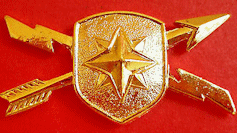Army Intelligence
 The general theory of the function of Army Intelligence contemplated that primarily it was designed to gain, analyze and distribute military information of the enemy; to interpret it for use in war plans and combat orders; and to protect its own forces against enemy Intelligence activity. Intelligence officers studied information concerning the enemy to become thoroughly familiar with his organization, tactics, habits and modes of thought. They were thus able to present the point of view of the enemy opposite them. They deduced the intentions of the enemy from information gathered by Intelligence agencies and prepared themselves to assist in the preparation of plans for operations by their ability to point out the effect that the enemy's dispositions, defensive organizations or intentions would have on them.
The general theory of the function of Army Intelligence contemplated that primarily it was designed to gain, analyze and distribute military information of the enemy; to interpret it for use in war plans and combat orders; and to protect its own forces against enemy Intelligence activity. Intelligence officers studied information concerning the enemy to become thoroughly familiar with his organization, tactics, habits and modes of thought. They were thus able to present the point of view of the enemy opposite them. They deduced the intentions of the enemy from information gathered by Intelligence agencies and prepared themselves to assist in the preparation of plans for operations by their ability to point out the effect that the enemy's dispositions, defensive organizations or intentions would have on them.
The branch supervised and directed the collection, collation, and dissemination of material used in positive Intelligence activity. It was interested in securing all possible information concerning enemy and neutral countries to the end of furnishing the armies with prompt and accurate information of all kinds. In addition it was charged with the training of officers for positive Intelligence duty. Counter-espionage within the Army had as its function to organize, instruct and supervise the counter-espionage service within the military establishment. This section was divided into a number of subsections in order to facilitate office administration.
It worked to collect, collate and disseminate military intelligence. It coöperated with the Intelligence Section of the General Staffs of allied countries in connection with military intelligence; prepared instructions in military intelligence work for the use of forces; supervise the training of personnel for intelligence work; organize, direct, and coördinate the intelligence service; supervise the work of Military Attachés; communicate directly with department intelligence officers and intelligence officers at posts, camps, and stations, and with commands in the field, in matters relating to military intelligence; disburse and account for intelligence funds; coöperate with the censorship board and with intelligence agencies of other departments of the government.
His Royal Highness Crown Prince Maha Vajiralongkorn first joined the military in January 1975 as an officer with the Royal Thai Army’s Intelligence Department. In October 1978, he was appointed as deputy commander of the King’s Royal Guards Battalion of the First Infantry Regiment and then promoted to become the battalion commander in November 1980.
|
NEWSLETTER
|
| Join the GlobalSecurity.org mailing list |
|
|
|

